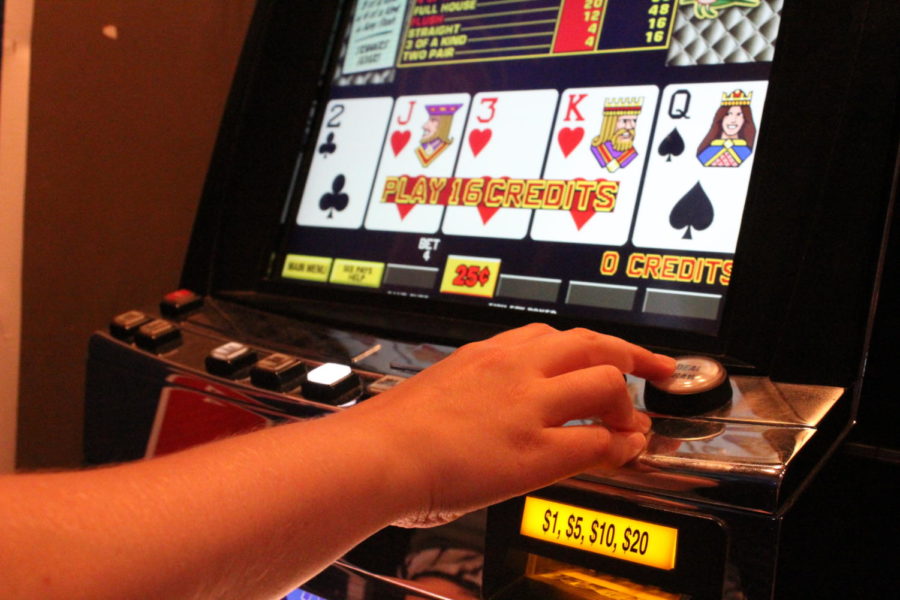Louisiana ranks as one of top 10 most gambling-addicted states
A customer uses one of the slot machines at Bruno’s Tavern in Uptown New Orleans. Bars and casinos across the city have slot machines allowing visitors to gamble. Photo credit: India Yarborough
April 26, 2019
Meredith was in the fourth grade when the trips to Harrah’s ended. She had thought it was normal for her family to spend random nights of the week, sometimes even weekends, at one of the casino’s hotels.
“We always had a really fun time,” she said. “I thought we were just really wealthy.”
But at age 10, Meredith discovered the truth.
“My mom sat me down on my parents’ bed and told me that my dad had a problem. I didn’t really understand it,” she said. “I don’t really remember the conversation, how it went, but I knew there was something up.”
Her father had a gambling addiction.
Meredith, a Loyola student who requested her real name not be used for fear it might affect future employment opportunities, still remembers the gut feeling she had when she heard the news.
“(My mom) basically told me that my dad had done something wrong,” Meredith said. “He had his own business and had access to his clients’ money and their bank accounts, and I guess when he ran out of our money, he turned to that and started abusing their finances, which is the reason my dad ultimately ended up going to prison for a year.”
Though gambling addiction exists in a fairly small percentage of the general United States population, Louisiana is one of 2019’s top 10 most gambling-addicted states in the U.S., according to a report released April 23 by WalletHub, a personal finance website. Gambling addiction has also made headlines in Louisiana in recent weeks after state senator Karen Peterson admitted last month to struggling with gambling addiction. Peterson had relapsed – something experts say is not uncommon.
According to clinical psychologist Jeremiah Weinstock, about 50 percent of people who start treatment for gambling addiction and obtain abstinence will relapse within a year.
Weinstock, who is also an associate professor at Saint Louis University, has studied and conducted research on gambling addiction since the early 2000s. He said unlike with other types of addiction, monetary issues are more pervasive in the lives of those who struggle with gambling addiction.
“Frequently people with gambling problems experience significant money problems because they’ve been losing lots of money gambling,” he said. “But with one lucky bet, they could turn it all around and win enough money to solve all their financial problems, so that creates a fair bit of these thoughts in your head that ‘If I could just be lucky, everything would be better.’”
Weinstock said it’s part of his job as a therapist to tell gamblers who come to him seeking help that further gambling is not going to solve their monetary issues. But he notes research indicates only about 10 percent of those who experience gambling addiction seek professional help in the first place.
“Folks who suffer from this particular process addiction – they tend to create really a lot of financial disruption, and they can come into treatment very desperate,” said John Antonucci, a licensed addiction counselor and owner of John Antonucci Counseling & Recovery in New Orleans. “They come to the treatment centers a lot of times feeling very, very desperate and not feeling that they have a way out.”
Antonucci’s practice focuses on all types of addiction. He said he treats two to three people a year for gambling addiction in particular but added that the specifics of gambling addiction parallel other process addictions.
“I come from a belief that addiction is a biological brain disease,” Antonucci said. “In fact, really, the actual behavior or substance is only a manifestation of trying to cope with symptoms of addiction. And although it can certainly impact the type of interventions one uses, it all works the same way in the brain.”
Antonucci noted that a number of people who experience gambling addiction also suffer from some form of depression, anxiety, trauma or other abuse disorders.
“It’s been my personal experience that suicide with pathological gamblers is pretty significant,” he added.
He noted that the strong feeling of desperation upon entering treatment is also something he expects is prevalent at higher rates in people who experience gambling addiction, as opposed to other addictions.
Meredith said her father opted to enroll himself in Gamblers Anonymous to address his gambling use.
“My dad actually went to Gamblers Anonymous for an entire year before he was in prison and continued to go after he was in prison,” she said. “I didn’t realize they had anonymous things for different addictions, because you hear about Alcoholics Anonymous but you don’t hear about Gamblers Anonymous.”
While Gamblers Anonymous has helped Meredith’s father – he hasn’t relapsed since he stopped gambling about 10 years ago – Antonucci said the 12-step recovery process is not the solution for everyone.
“The success is significantly less than people that go to AA or (Narcotics Anonymous),” Antonucci said. “Studies have been done with people with gambling addiction. The percentage of people that are still in Gamblers Anonymous and abstaining from gambling a year after their first meeting is somewhere in the range of about three to four percent. Whereas, for people who go to AA it’s around 10 to 12 percent.”
Antonucci said no studies exist on why that is, but he suspects it may have to do with each program’s support system.
“With AA, it’s a much older organization. There’s people that have been in long-term recovery, so there’s a stronger support system,” he said. “GA has fewer meetings to go to. The level of sobriety, if you will, may not be as strong – so I think those are some reasons.”
Other treatment options typically include working with a therapist and making a commitment to long-term counseling, Antonucci said. He added that Louisiana is one of a few states that offers free gambling treatment to its residents
“The good thing about Louisiana is that it’s one of the very few states that offers on-demand gambling treatment,” Antonucci said. “A lot of people aren’t aware of this, but when they first started making gambling legal in the state, they had the casinos set aside a significant chunk of money for treatment specifically for gambling addiction. … So there are actually some really good resources that people don’t have when it comes to other types of addictions.”
That on-demand treatment is offered through the Louisiana Association on Compulsive Gambling, the state affiliate of the National Council on Problem Gambling.
And according to Antonucci, “recovery is possible.” He would know, too, as he has been in recovery for drug and alcohol addiction for 13 years.
“I do bring to my work a pretty high degree of empathy and understanding for people who are trying to get into recovery and what that looks like and the struggles that they might have,” he said. “People can get really hopeless and think that just because somebody else has been successful, they can’t be successful. I think it’s really important to send a message to folks and their families that people recover from addiction every day.”








